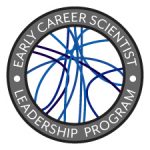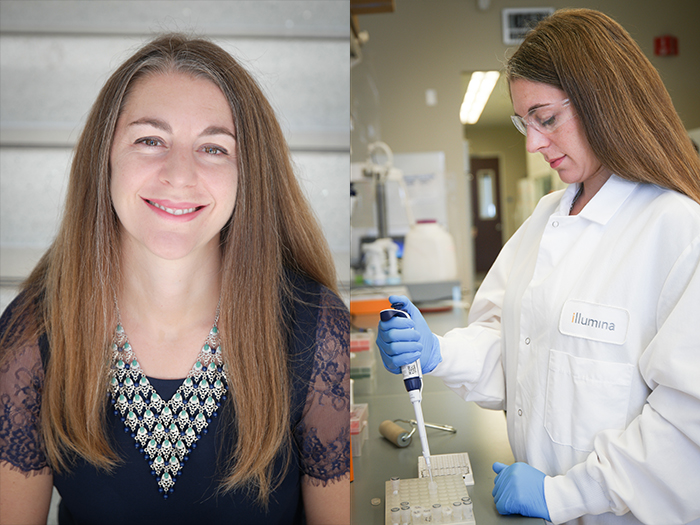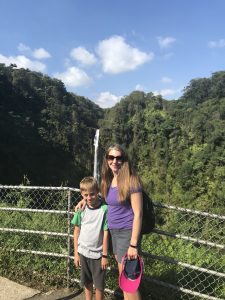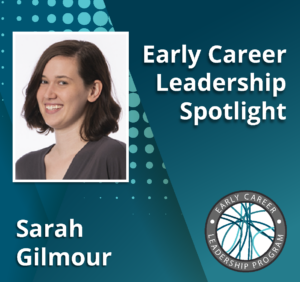 Scientist and manager Amanda Young develops applications for next-generation sequencing at Illumina. She talks about how careers in product development broadly impact the scientific community and how you can tailor your skills to land a job.
Scientist and manager Amanda Young develops applications for next-generation sequencing at Illumina. She talks about how careers in product development broadly impact the scientific community and how you can tailor your skills to land a job.
In the Decoding Life series, we talk to geneticists with diverse career paths, tracing the many directions possible after research training. This series is brought to you by the GSA Early Career Scientist Career Development Subcommittee.
Amanda Young completed her PhD in biology at MIT with Phil Sharp as part of a group that was developing methods for building sequencing libraries from RNA. She did a short postdoc at the Salk Institute before deciding to transition into industry—a choice that felt like a big risk at the time. Now, she leads a team of scientists at Illumina who develop applications for next-generation sequencing in microbiology and infectious disease. She hopes other scientists will consider careers in the dynamic product development industry.
What experiences led you to your current position?
The company Solexa launched the first next-generation sequencing instrument, called the Genome Analyzer, while I was working on my PhD. The instrument was revolutionary in its throughput and workflow, offering short reads that were great for studying microRNAs, and I was part of the group effort at MIT that developed the methods for it. I loved being part of a team of grad students and postdocs doing collaborative work.
Following my PhD, I moved to San Diego and did a postdoc at the Salk Institute for one year. At the time, it felt like conventional wisdom that having a postdoc was important to getting an industry position without closing the door to other career paths. As I started my postdoc, I thought I would be excited to work on a new project. Instead, I realized that what I truly loved was developing new technologies, as I did during my PhD. Around the time of my realization, Illumina had acquired Solexa and was rapidly advancing the technology for next-generation sequencing. I leveraged the skills I developed during my PhD training to obtain a position at Illumina.
What do your days look like in your position at Illumina?
At Illumina, I lead a team of scientists while also working closely with our sales and marketing teams. My work with the marketing team focuses on strategic planning, and we work to decide where we want to be in the next three to five years. I also lead collaborations with our customers, including academic and government labs and other companies. I attend conferences to hear about the latest research, learn how customers are using our technology, and give talks at seminars or workshops. I’m a pretty social person, so I feel like my best science is done when I get to work with other highly motivated and creative scientists. When I joined Illumina, I was really happy to see that collaboration is one of the core values of the company.
What’s unique about my role now is that I have a lot of opportunities to contribute to new and different projects, technologies, and fields. In academia, sometimes you get set in a field and then you’re in that field for decades, diving deep into a single subject. In my time with Illumina, I’ve been part of our oncology, forensics, and microbiology groups. I love the new challenges of working in different fields and being able to develop a broad understanding of biology.
What excites you about your career at Illumina?
People often think research in industry involves working for pharmaceutical companies to develop drugs. At Illumina, we like to call ourselves a tools provider: we make tools and instruments that bench scientists use. The companies that provide bench scientists with reagents and equipment have teams of scientists that are working to develop products, and really cool science happens as part of product development. I didn’t anticipate how exciting my career would be, but being involved in product development allows you to impact research scientists by developing tools they can use in the lab.
What advice do you have for people interested in pursuing a research career in industry?
People who want to pursue research positions in industry should start looking into companies that are doing things that match their skills and interests. Hiring in industry is very skill-set driven, so it’s important to look at the skill sets and expertise required for available positions. Job descriptions will help you understand what skills are valuable in the market, and you can start tailoring the experiences and expertise you’re gaining during your PhD or postdoc to those skills. That may lead you to take your project in a slightly different direction, strike up a collaboration, or take a course to help boost your skills in a specific area. It’s important to think about how your skills translate—and to highlight those skills as you start to apply to jobs.
How has mentorship influenced your career?
My PhD advisor Phil Sharp is a brilliant scientist, but he also has a head for business. I learned from him that you can be a scientist and do business with honesty and integrity; those things aren’t mutually exclusive. At Illumina, my mentors have helped me develop my managerial skills and business acumen. One of our senior leaders once mentioned to me the idea of having a personal board of directors. You benefit from having multiple mentors, and for me, some of the people on my “board” are my superiors, who are in roles that I aspire to. Peers and team members also give me a lot of great advice and feedback about being a manager and leader. In addition to scientists, I think having people that are outside your own field can provide perspectives that help you grow in different directions.
What experiences outside of your scientific training have had the greatest impact on your career?
As a mom of two boys, I’ve learned from them to be more flexible and open-minded. My horizons have been greatly expanded by their interests that are different than mine and by their distinct personalities. The business environment at Illumina changes rapidly; there are always new projects, and we might have to shift into a different direction on short notice. In fast-paced environments, being flexible and having an open mind is very important for success. I imagine that applies at other companies as well, and I think that bringing my parenting skills in to my day job really helps.
About the author:
 Dina Beeler is a liaison on the Early Career Scientist Career Development Committee and a PhD candidate at the University of Illinois at Chicago. She is committed to helping other scientists realize and achieve their career goals.
Dina Beeler is a liaison on the Early Career Scientist Career Development Committee and a PhD candidate at the University of Illinois at Chicago. She is committed to helping other scientists realize and achieve their career goals.
Learn more about the GSA’s Early Career Scientist Leadership Program.














